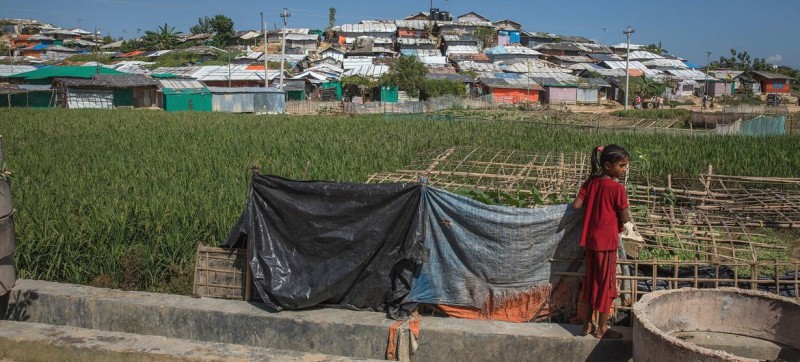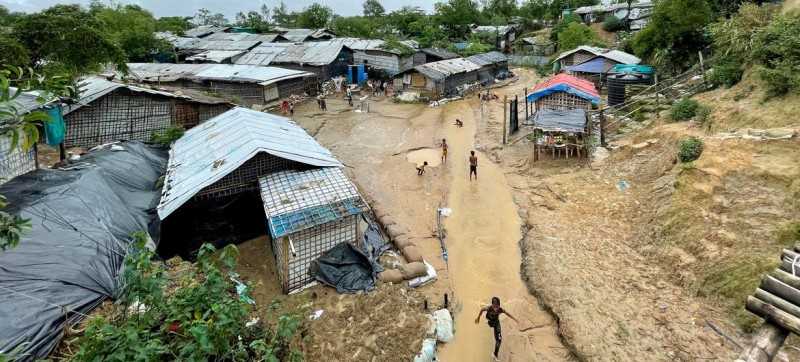Bangladesh has provided shelter to Rohingya refugees from Myanmar following five separate outbreaks of violence and persecution. This week marks five years since more than 700,000 ethnic Rohingya fled military persecution from Myanmar for neighbouring Bangladesh, the UN refugee agency, UNHCR, said on Tuesday, appealing to the international community for greater support. “The latest exodus from Myanmar is now officially defined as being a protracted situation,” UNHCR spokesperson Shabia Mantoo told journalists at a regular press briefing in Geneva. Since the onset of the humanitarian crisis, the Bangladesh Government, local communities and aid agencies have been quick to assist refugees arriving in what is now the world’s largest refugee camp in Cox’s Bazar. Many Rohingya there continue to tell UNHCR that they wish to return home to Myanmar – so long as conditions for safe, dignified and sustainable returns are met and they can enjoy freedom of movement, access to documentation and a pathway to citizenship.
Stepped up assistance
This week marks 5 years since 700,000+ Rohingya women, men and children fled Myanmar for Bangladesh, joining hundreds of thousands of others. We are appealing for much greater efforts to secure both financial support and solutions for the Rohingya.https://t.co/GB557H9TiB
— UNHCR, the UN Refugee Agency (@Refugees) August 23, 2022
They also underscore the importance of accessing services and income-generating activities.
Dependent on aid
For the almost one million Stateless Rohingya refugees, conditions in Bangladesh are extremely overcrowded, and they remain fully reliant on humanitarian assistance for survival.
“With decreased funding, they face many challenges in their daily lives,” said Ms. Mantoo, citing multiple humanitarian assessment surveys that found proper nutrition, shelter materials, sanitation facilities and livelihood opportunities to be among the most commonly unmet needs include.
“Some have resorted to dangerous boat journeys to seek a better future”.
The UNHCR spokesperson also pointed out that violent incidents, especially for women, children and people with disabilities, are often under-reported.
Violence against children and women, especially gender-based violence, is “shrouded in stigma” that can render survivors voiceless, often unable to access legal, medical, psycho-social or other forms of support, she said.
Education needs
Support must be “stepped up” for education, skills development, and livelihood opportunities, Ms. Mantoo continued, reminding that these will not only prepare refugees for eventual return but also help them remain safe and productive during their stay in Bangladesh.
While some 10,000 Rohingya children in Bangladesh are already enrolled in the Myanmar curriculum, taught in the Myanmar language, support for sustained and expanded access to the curriculum is needed.
“This is a milestone towards a more formal education and helps close the gap for older children who previously had no learning opportunities,” said the UNHCR spokesperson.
Skills development
UNHCR is also appealing for further investment to ensure refugees can benefit from skills development, including vocational training and other forms of capacity-building for adolescent and adult refugees.
In addition to allowing the refugees to support their communities and live with dignity in Bangladesh, it will prepare them for rebuilding their lives when they can voluntarily and safely return to Myanmar, which is currently living under brutal military rule following the coup last year.

Rohingya children play after the rain in Nayapara refugee camp in Teknaf, eastern Bangladesh.
Crucial support
While international support has been and is crucial in delivering lifesaving protection and assistance services for Rohingya refugees, funding is well short of needs.
The 2022 response plan, which seeks over $881 million for more than 1.4 million people, including Rohingya refugees and more than half a million most affected host communities, is only 49 per cent funded, with $426.2 million received, according to UNHCR.
“The international community must do more to ensure that the Rohingya do not continue to languish in displacement,” stressed Ms. Mantoo, asking that efforts be “redoubled” for increased political dialogue and diplomatic engagement to create conditions for voluntary, safe, dignified and sustainable return.

